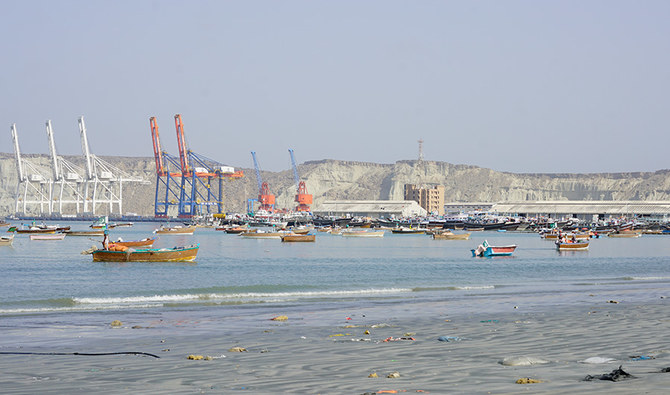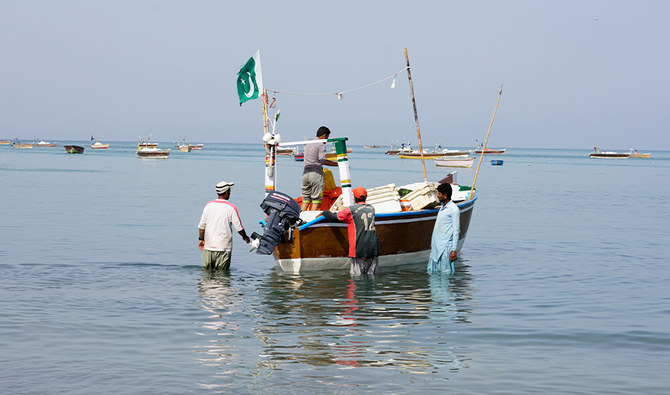GWADAR: For over two decades, Pakistani officials have promised to transform the poor coastal village of Gwadar into Pakistan’s version of Dubai, or a second Shenzhen, a tiny fishing community in China that has developed into a sprawling megacity.
Gwadar, in the restive Balochistan province, forms the southern Pakistan hub of a $62-billion China-Pakistan Economic Corridor (CPEC) of infrastructure and energy projects that Beijing announced in 2014. The project is a flagship of China’s Belt and Road initiative to build a new “Silk Road” of land and maritime trade routes across more than 60 countries in Asia, Europe and Africa.
So far, Beijing has pledged vast aid for Gwadar — which overlooks some of the world’s busiest oil and gas shipping lanes — and is building a commercial deep-water port there. A school has already been constructed and $500 million more in handouts have been promised, including $230 million for a shiny new airport. A hospital, college and badly-needed water infrastructure will also be built with Chinese grants.
But locals, particularly Gwadar’s fishermen, are worried. The expansion of the port has already displaced around 800 fishermen who live on or close to the port. Now, the construction of the Gwadar Eastbay Expressway is deepening worries.
“This is going to deprive us of our source of earning,” Muhammad Akber, a 71-year-old fisherman, said at Dimi Zarr on the east bay of the port. “Fishing has been our profession since the days of our forefathers. But the way we are being pushed out, we may lose this.”
Until 2007, what is now being built into a commercial port was a tiny jetty jutting out into the Arabia Sea. In March of that year, military ruler General Pervez Musharraf officially inaugurated the port, promising to make it a gateway for trade with Central Asia. China provided 80 percent of Gwadar’s $248 million initial development costs. Pakistan’s two other ports are at Karachi, 450 km to the east.
The first round of displacement of fisherman occurred then as construction of the port began in 2007. Now as the Chinese have picked up the expansion plans under the CPEC project, an expressway is being built to connect the east bay of the port directly to the Makran Coastal Highway.
The east bay is where a majority of fishing takes place, Akbar explained, and construction of the expressway has disrupted work.
Earlier this year, the government said it would allow three passages for boats underneath the expressway so that fishermen were not disturbed. Locals have largely accepted the proposal but fear persists that once the port is fully functional, the fishermen’s livelihood will be the last thing on the government’s mind.
“We haven’t avoided making any sacrifice [for CPEC] as we believe in development and we want development. But we also strongly believe we must be the first and prime beneficiary,” Akber said.
Federal Minister for Maritime Affairs, Ali Haider Zaidi, said the government had addressed all the concerns of fishermen.
“The Gwadar Development Authority has acceded all demands for design changes to the Eastbay Expressway by including three bridges and a breakwater to its design,” Zaidi told Arab News. He said the government was also constructing two fishing jetties at Surbandan and Pishukaan and assured that fishing on the east bay would not be disturbed due to the construction of the bridges and the breakwater.
Zaidi said the Prime Minister’s flagship ‘Naya Pakistan Housing Scheme,’ launched this month, included 110,000 apartments for the fishermen of Gwadar who would also get health insurance cards in the near future.
“The Pak-China Vocational Training Institute (PCVTI) is being constructed with a Chinese grant of $10 million so that fishermen can acquire the necessary skills for port-related services,” he said. “Once the port is fully operational and the CPEC route is completed … it will attract other investments such as hotels and tourism, which will create job opportunities for local fishermen and their families,” Zaidi said.
But the people of Gwadar say they have heard all these promises before.
“Long before Musharraf inaugurated the Gwadar port in 2007, we were asked to see a dream of a beautiful new life,” Nasir Raheem, a youth activist and resident of Gwadar, told Arab News. “We dreamed but nothing changed.”
“Who knows what we will get from this massive project?” he said.
The skepticism is not without reason. Balochistan is Pakistan’s biggest but poorest province, plagued for decades by a low-level insurgency by separatists seeking autonomy and control of gas and mineral resources. The province also has the country’s largest gas reserves and is rich in minerals, including copper and uranium. Militants often attack pipelines, power transmission cables, railway tracks, buses and military and government installations. They also oppose the construction of the port.
Though the security situation has improved in recent years and many separatists have surrendered, attacks continue. Earlier this month, a separatist group pulled 14 members of the Pakistani armed forces off a bus and shot them dead on the province’s southern coast.
Balochistan also has some of the worst health indicators in the country. About 62 percent of its population does not have access to safe drinking water and more than 58 percent of its land, which makes up 44 percent of Pakistan’s total land mass, is uncultivable due to water shortages.
“Prosperity is a combination of many things: better health care, best education and employment. We want prosperity,” said Dad Kareem, another fisherman. “Our hospitals don’t offer more than treatment for fever and cough.”
Many also complained about the lack of transparency in executing projects in Gwadar.
“The people don’t believe the government is serious,” said Ahmed Iqbal Baloch, the president of the Gwadar Builders Association.
In 2016, Pakistan welcomed the first large shipment of Chinese goods at Gwadar, where the China Overseas Ports Holding Company Ltd. took over operations in 2013. It plans to eventually handle 300 million to 400 million tons of cargo a year and develop seafood processing plants in a nearby free trade zone sprawled over 2,281 acres.
Anticipating development, many locals sold their lands. But property prices have continued to rise two- to four-fold on average since 2016 and many now feel they were pushed to let go of their properties at much less than the market price.
Baloch from the Gwadar Builders Association insisted that once the port was fully functional, the major beneficiaries would be the people of Gwadar.
Shahzeb Khan Kakar, Director General of the Gwadar Development Authority (GDA), said work on a water distillation plant with the capacity to produce 5 million gallons per day was just getting started. Separately, two dams were already providing 50 million gallons of water to the parched city.
Currently, Iran is supplying 100 megawatts of electricity to Balochistan’s Makran division, of which Gwadar is a part. This, locals say, is insufficient and there are often month-long power breakdowns.
Kakar said these issues would be resolved once a 300MW coal power plant was built under the CPEC portfolio. Prime Minister Imran Khan has also ordered that Gwadar be connected to the national grid.
Officials also said locals’ complaints that they were getting jobs in CPEC projects were unfair.
Jiand Baloch, a spokesperson for the Gwadar Port Authority (GPA), said almost 95 percent of the staff employed at the Authority was Baloch and a sizeable number were from Gwadar. Arab News could not independently verify these figures.
Baloch said more locals would be employed in the Authority once planned free trade zones were fully functional and other CPEC projects, including the vocational training institute, were completed.
Sohail Asgher, a deputy director at GPA, said the youth of Gwadar would be taught 101 new trades at the vocational institute to prepare them for employment at the industrial zone.
“A single batch will produce around 5,000 skilled workers, both males and females,” Asghar said.
Engineer Dadullah, a resident of Gwadar city and project manager at the Free Trade Zone, said around 700 locals were already employed at the industrial zones. “More will get jobs as it expands,” he said.
But Faisal Baloch, a local youth who lives near the port, said the government needed to follow a policy of transparency to gain the trust of the people of Gwadar.
“Hollow claims in the past have left us with little reason to believe the government’s claims today,” he said. “Let’s wait and hope to see what we get from CPEC.”






















